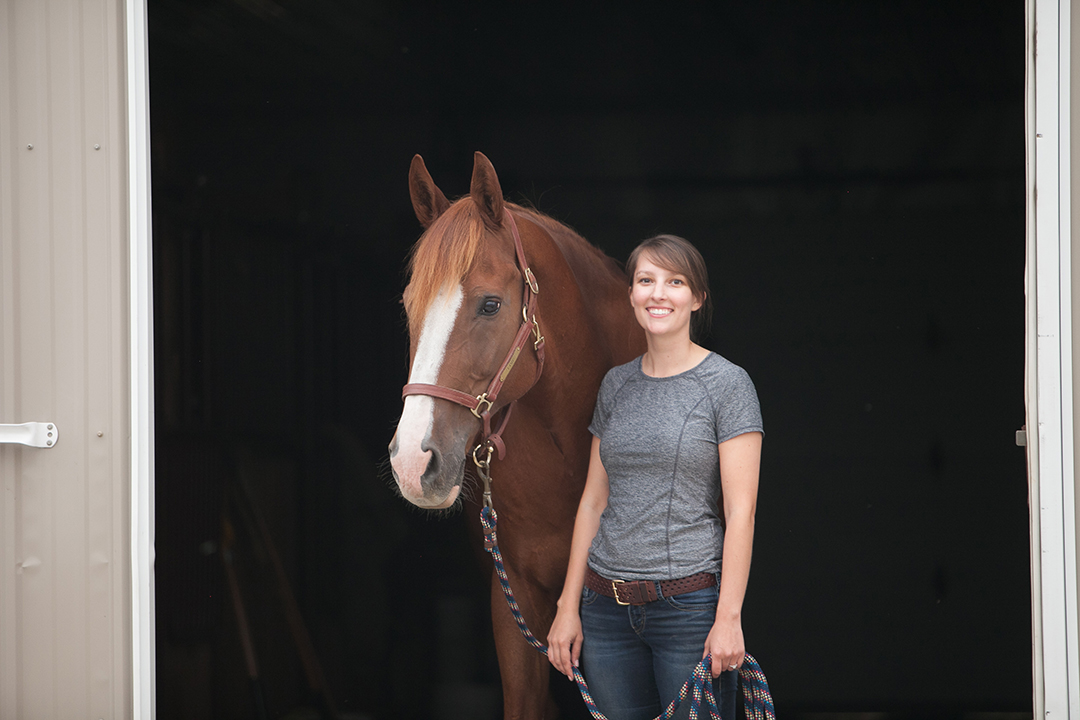
‘Lea Riddell, equine vet’
Dr. Lea Riddell has never really fit the mould of an equine veterinarian. A self-proclaimed “city girl,” Riddell was born and raised in Winnipeg, Man. — far from any farm or acreage and with no horses nearby.
By Harrison BrooksIt wasn’t until she was given a pony riding lesson for her eighth birthday that she discovered her true love for horses. That set the path for Riddell’s plans to becoming an equine veterinarian — save for a few twists and turns.
“I actually have a picture, [I] don’t know when I made it, but it was from elementary school and it’s a collage of me as an equine vet,” says Riddell. “It says, ‘Lea Riddell, equine vet.’ So I wanted to do this forever.”
One of those twists came during high school. Riddell still knew she wanted to be a vet, but because most of her experience was with dogs and cats, she volunteered at a local small animal practice and assumed that a career as a small animal veterinarian might be a better fit for her.
While completing her undergraduate degree in biology at the University of Manitoba, Riddell volunteered with a local equine surgeon, Dr. Chris Bell (WCVM ’06). That experience changed her focus and set her back on the path to becoming an equine specialist.
It wasn’t an easy journey to make: only 15 Manitoba students are annually accepted to the Western College of Veterinary Medicine (WCVM), and fulfilling all the requirements before applying is a rigorous process. “Once in a while you think this is a lot of work to get into a program. But honestly, there were never really any alternative options that I was interested in,” says Riddell.
Riddell’s next big step came in 2012 when she moved away from home for the first time in her life to begin school at the WCVM in Saskatoon, Sask. Luckily, she lived with a fourth-year veterinary student who helped her until she got to know some of her classmates.
“I knew another girl from Winnipeg who also got in so she and I stuck together. But you meet a lot of people really fast because you spend so much time together,” says Riddell. “The adjustment was kind of hard, but everyone else is in the same boat, so you make friends pretty easily.”
After graduating in 2016, Riddell stayed on to complete a one-year clinical internship in the WCVM’s Equine Field Service and then began a combined residency-Master of Science program with Dr. Stephen Manning as her supervisor. Her research project focuses on the effectiveness of a specific glycoprotein at reducing uterine inflammation in mares after breeding.
“All of the veterinarians who I work with on Equine Field Service are very knowledgeable and skilled clinicians, and I am very fortunate to have the opportunity to learn and work with them,” says Riddell.
“While I was an intern I worked closely with the residents. I had insight into what their residencies were like, so I had a pretty good idea of what to expect.”
During her first year as a resident, Riddell has taken on various cases in many different areas including surgery, medicine and reproduction. She’s also learned how to cope with working outside in Saskatchewan.
“I think the most difficult thing to adjust to within my internship and residency was learning how to work outside when it is minus 40 [degrees Celsius],” says Riddell. “That isn't something you learn in vet school!”
Even though Riddell didn’t grow up with horses in her back yard, they’ve always been part of her life one way or another. Horses started out as the source of her childhood infatuation, then turned into an interest and a passion for her veterinary career.
Now going out for a ride on her horse is one of her favourite stress relievers when Riddell needs a break from school and work. And when her fiancé asked her to marry him, it was fitting that her horse was standing right beside him during the proposal.
Riddell isn’t quite sure where she will end up working after she finishes her program in 2020. But wherever she goes, there will be opportunities for her — thanks to the wide range of experience she is gaining at the WCVM.
“This residency opened up more doors for me. I love it here because there is such great mentorship all the time. There’s a surgeon down the hall, a radiologist down the hall and an ophthalmologist down the hall, which is amazing as a resident to have all those resources available to me,” says Riddell.
“When you are out in private practice that’s not always the case, but that’s why I am doing [this residency] … so I have all the knowledge I can for the future.”
This story is part of the Fall 2018 edition of Horse Health Lines. To read more stories, check out TEHRF.
